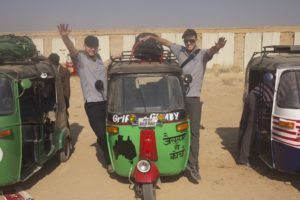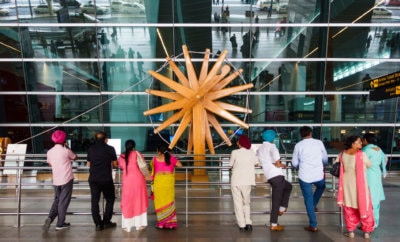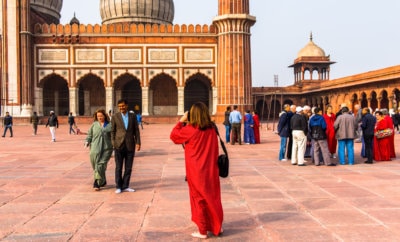Life
Three Wheels and a Lifetime of Adventure

Rickshaw Run
Autorickshaw rallies provide foreign as well as Indian participants a glimpse of the country's culture through adventure-filled rides.
The autorickshaw is an ingenious vehicle, almost perfect for the roads of India, as it snakes its way into the tiny lanes, past the traffic jams where cars are at a standstill for several minutes.
A short ride in an autorickshaw is often a breezy one, but hardly can one imagine the three-wheeled vehicle to take on great distances, like travelling from the tucked away Shillong in the north-eastern corner of the Himalayas to Kochi in the south of the country. Not so for the eager participants and organizers of the various autorickshaw rallies that take place in India. These rickshaw rallies are held by various organizers in India and require teams of participants to drive the vehicle in difficult terrains.
“Tackling a long journey in a rickshaw is not a piece of cake,” says Matt Dickens, who carries the designation of the Creative Overlord at the Adventurists, one of the companies that organizes autorickshaw rallies in India. “It takes courage and determination to push yourselves as well as the vehicle to the limit, and then some.”
The journeys are also about self-discovery as much as exploration of a culture and nature that is unlike one’s own. It is less about winning and more about witnessing the colors of India.
It is this thrill and love for adventure that attracts enthusiasts from all walks of life and from different countries for rallies such as the Rickshaw Run organized by Dickens, and Rickshaw Challenge that is held by Chennai-based company Travel Scientists founded by Aravind Bremanandam.
Participants who signed up for the 2018 run with Travel Scientists come from varied backgrounds. While one of the teams is from Luxembourg, another is from Norway. The two-women team from Norway is experienced in taking up such off-beat challenges. Laurent Nilles and Laurent Petry, the men from Luxembourg are, however, looking forward to their first such experience.
“We once drove a car straight into the rush hour of Brussels, Belgium, a city with almost 180,000 inhabitants. I guess the streets of India will be piece of cake in comparison,” they say.

Rickshaw Run
Tim Dinte is another participant who is looking forward to attend the event in January 2018, five years after he participated in one as a 25-year-old environmental engineering student from Australia. Dinte travelled from Jaisalmer to Kochi in two weeks in an autorickshaw with Brendan Griffin, who was then pursuing a PhD in astrophysics. This time, Dinte wants to return with two others for the Adventurists race.
“I keep returning to India as I love the pace of life here,” he tells Little India. “The food and the culture is amazing, and of course, I’ve never met people who are as willing to help the poor as Indians,” he adds, talking about how they raised about $4,000 for Indian charities during the run last time.
He is not the only one who wants to keep coming back. Michael Anschel, who works for an architecture firm at Minneapolis in the United States, is a past participant who will join the Himalayan run in the second half of 2018. He broke his wrists, received a head injury and severed a ligament in the leg during the race in Shillong, but that has not broken his determination to return.
The rough terrain and extreme weather can sure be daunting. Bremanandam, however, emphasizes that injuries are not common. He points out that the rickshaw is automatically insured once the participants enter the race. “Luckily, in more than 10 years of the Rickshaw Challenge, there has never been a serious accident,” he says.
Technology, of course, now plays a big part in making life easier for the participants and organizers. Travel Scientists provides day sheets to every team that informs them about the route for the day and provides tips for stops and sightseeing on the way.
Technology, however, is of no help when it comes to tackling the rough terrain of the Himalayas. It is common knowledge that the terrain in the Himalayas is not easy, which is why the Rickshaw Run is only open to participants who have been a part of the previous events organized in simpler terrains such as the Jaisalmer-Kochi route. “Just like most of our events, it’s an unsupported adventure, which means that if you come across any problems, you need to sort it out yourselves — relying on your own wit and daring to get yourselves through to the end,” adds Dickens.
Travel Scientists gives participants rickshaws that are equipped with a Wi-Fi hotspot, so the teams can use online navigation systems like Google maps. The participants are given local sim cards for emergencies, while an organizing team that them, to find and rescue them if something goes wrong.

Tim Dinte (right) and Brendan Griffin from Australia during Rickshaw Run in 2012.
The participants of the Adventurists, on the other hand, are encouraged to seek directions from locals. “Since an autorickshaw is not meant to brave such a difficult terrain, it may sometimes break down and this leads to an inevitable interaction between locals and the participants,” says Dickens.
He swears by paper maps though. They are the best way to explore a terrain and that helps one learn on the way, he says, adding that the fact that an autorickshaw does not dash off lets the participants enjoy the stunning views that India offers.
While participants, who join the rallies from all over the world, do get ample chance to interact with locals, many of them wish the events had more Indian members. “We don’t get quite as many Indians as we’d like, though we do get quite a few,” says Dickens. “There really is no better way to explore India than the humble autorickshaw.”
Participants are handed a tracking map to update photos and videos, so others can keep track on their progress. The map is only updated when the teams want it. For worried family members back home, the tracking map comes in handy to know that their loved one is safe.
Dickens insists that following rules is important while participating in the run. “They’re completely open to the elements and everything that India cares to throw in your direction,” he says. “There are no fixed rules as such, though being nice, not being an idiot and sticking to the rules of the road are strongly recommended.”
The passion for adventure prompts these participants to put in their best foot forward. Teams are often ranked according to their tasks and challenges assigned to them.
There is a scoring system in place for team ranking, says Barbara Litzlfellner, the general manager at Travel Scientists. “Each day we assign our teams a certain task and challenges, these are often a voluntary exercise, but they are always great fun,” she adds. “Besides that, the main rule of the Rickshaw Challenge, which may not help you win but will assure that you have a great time, is quite simple: respect your fellow teams and respect India, its people and its diverse culture.”
The journeys lend to interesting anecdotes as participants ultimately are in it for having a good time. A participant this year even proposed to his girlfriend, saying, “If we could survive this together, we will probably be able to survive all of life’s challenges together.”




You must be logged in to post a comment Login